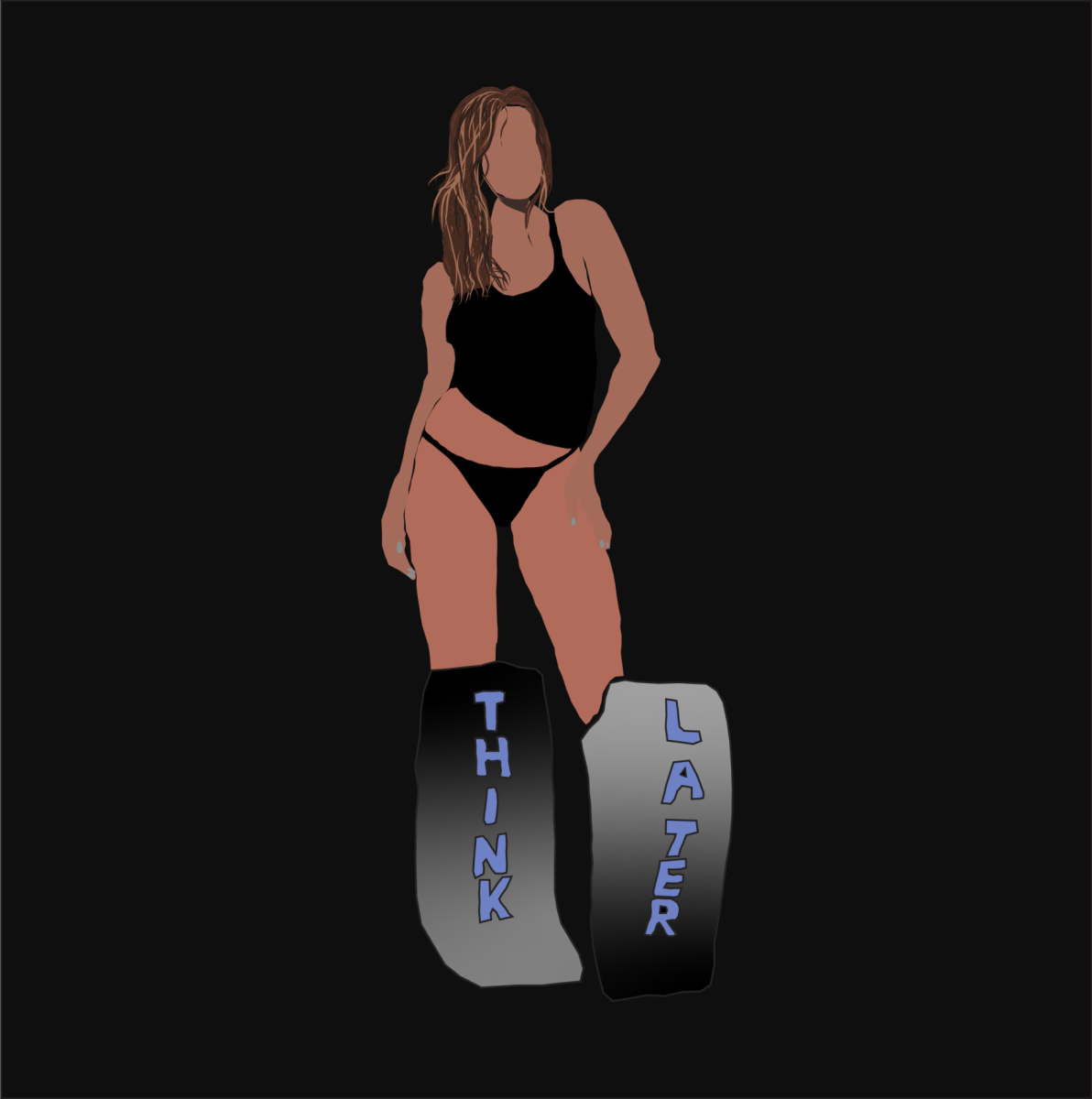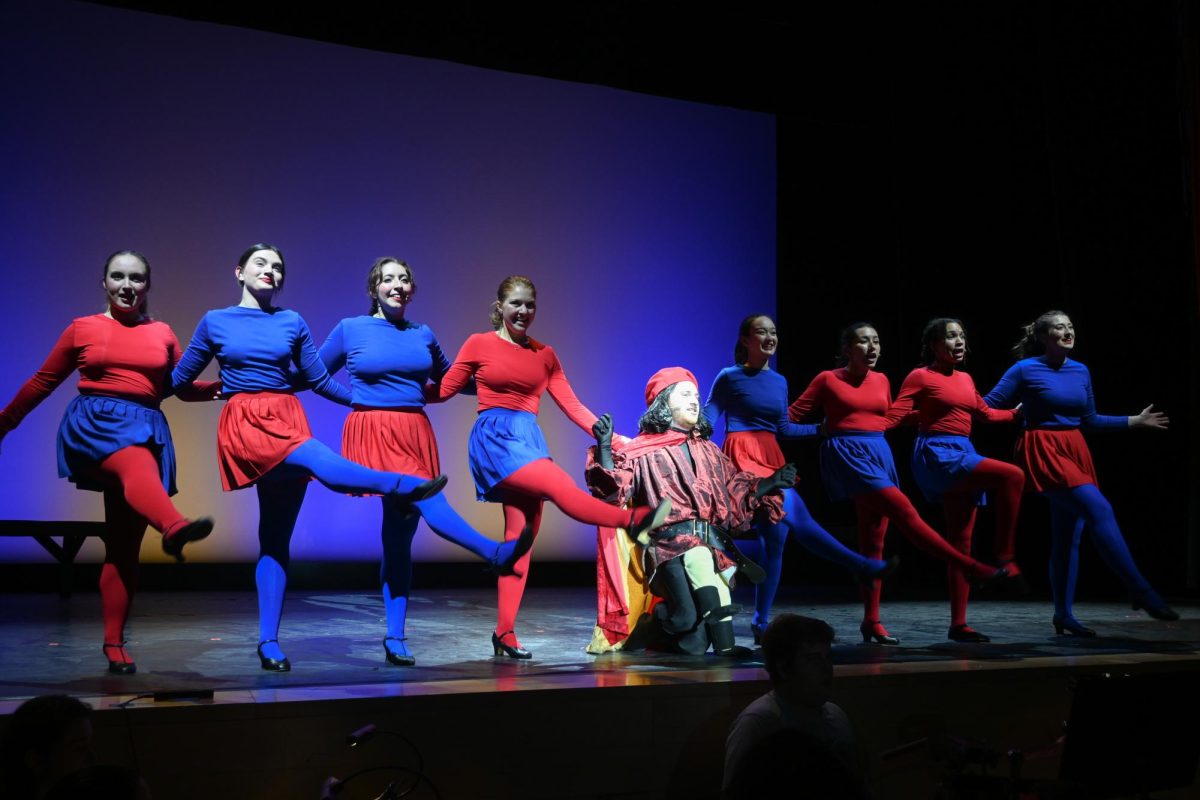Canadian sensation Tate McRae has returned with her sophomore album, “THINK LATER.” A musical journey through her tales of heartbreak and self-discovery, the album’s 14 tracks complement each other to create an incredibly heartbreaking listen.
Following her acclaimed debut album “i used to think i could fly,” McRae moves away from songs like “feel like shit” and “chaotic,” which took a sheltered, fearful approach to storytelling, and toward a confident and self-motivated voice that shines throughout “THINK LATER.”
She worked with superstar Ryan Tedder of OneRepublic — who also worked with Taylor Swift on “1989” and Beyoncé on “I Am… Sasha Fierce” — to hone her vocals and production, staying true to her style while also improving it and progressing her musical talent.
The album kicks off with “cut my hair,” a song that symbolizes moving forward and shedding the past — many women will often drastically change their appearance to take their lives back following a rough relationship. McRae cleverly uses cutting hair as a metaphor for personal growth and self-improvement post-breakup.
The lead single of “THINK LATER” is none other than “greedy” — an upbeat, catchy tune that topped the charts and went viral on TikTok. On the track, she tells her suitors to stop being self-absorbed while hyping herself up, remarking that she’d want to date herself, too, if she were them. She sings, “I see you eyein’ me down, but you’ll never know much past my name / Or how I’m runnin’ this room around and that I’m still half your age,” establishing a confident and playful aura.
“run for the hills” explores the dangerous allure of a toxic relationship. McRae expresses her obsession and internal conflict, pleading, “Don’t tease me / And keep me around like it’s easy / When you know deep down that it’s / Never gon’ ever be more than just something that’s fuckin’ me up.” She knows that the harmful relationship holds a controlling grasp on her, but she struggles to break free from a world centered around her partner, singing, “I get obsessive with you / All that I want is attention from you / Break into my life and break all my rules.”
On “hurt my feelings,” McRae fantasizes about someone who is already in a committed relationship. She lusts for him, writing, “Got me heavy breathin’ / Every time we’re speakin’,’” in the hopes that he’ll leave his current girlfriend for her. It touches on her past relationship with athlete Cole Sillinger, referring to his hockey jersey — “She wears your number, but I got what you like / She’s got you right now, but I’m still on your mind.” She wants him badly, even though she can’t have him.
Moving forward, “grave” reflects on the difficulty of fixing someone’s flaws to save a relationship. McRae explores the inevitability of certain endings, the challenges of holding onto grudges — “I hold my grudges like I held you” — and how their relationship went against her personal values and standards. She uses graves to symbolize the mistakes that her partner keeps making, no matter how hard she tries to fix them.
The sixth track of the album, “stay done,” navigates the thin line between love and hate in a relationship. McRae describes the nature of being “frenemies” with someone and emphasizes the difficulty of saying goodbye, calling him a “one-way street that [she] can’t get off.” She loves him even at his worst as he drags her through the mud, singing, “We’re best friends and enemies / We’re good till you’re dead to me / I told you ‘Goodbye’ like, hundred million times.”
The second single of the album, “exes,” is a reflection of McRae’s unapologetic nature — “I’m sorry that you love me, changed my mind up like it’s origami” is the recurring and catchy line that signals her lack of predictability as she flirts with many suitors. She tries to justify her lack of care with the unimportance of their relationship, singing, “Kisses to my exes, I know that I did you dirty / Little messed up, little selfish, we ain’t married, I ain’t thirty.”
McRae exposes the pain of being betrayed in “we’re not alike,” describing the actions of a supposed best friend who breaks the “girl code” of loyalty. The track takes on a rock production that intensifies the emotional impact as McRae scolds her friend — “She calls herself a girl’s girl, that’s a lie / Said she had my back but she had the knife.” McRae, feeling heartbroken, claims she would never stoop to that level of deceit for someone she trusted.
Listeners delve into McRae’s hometown experiences when listening to “calgary” as she reflects on her youth, including her struggles with substance abuse and her challenges as a teen. She feels like a child every time she returns, singing, “I’m twenty but I still feel like fifteen / Same fears, same dreams,” to both start and close the track.
Following “calgary” is “messier,” where she explores the complicated, yet endearing, aspects of a relationship. McRae and her partner navigate through pride and imperfections, emphasizing that there’s no one else they’d rather be with because they understand each other’s flaws, making them a dangerously messy pair. “We both know this happens every time, every time / You tell me a lie, I’ll tell you five,” she sings.
The upbeat title track, “think later” encourages living in the moment and dealing with consequences afterward. McRae narrates a night taking place in Boston, emphasizing the thrill of living dangerously rather than rationally considering the consequences — “My friends got scared and they called the cops / But I’m just at the Ritz with the door locked.”
As the album nears a close, “guilty conscience” arrives with a bang — McRae recklessly and blindly follows her partner, even though he comes with danger. She aches, “I’ll be wantin’ you back till the cops stop callin’ / Waist deep in the mess you started” and alludes to a criminal lifestyle.
The pace of the album slows down to the heartfelt track “want that too,” which explores the pain of betrayal in the music industry. McRae reflects on being blindsided and losing parts of herself in the pursuit of success, singing, “Take my youth and fuck me over, make me realize now I’m older / Never wanna be anything like you.” When she gave everything to music, those with more power than her took advantage of her youth, consuming her childhood.
Closing out the album is “plastic palm trees,” a softer, reflective piece that looks back on a breakup with an unfaithful partner. McRae expresses that she’s healing, but it hurts — after all, the plastic trees are a metaphor for her love in the relationship, seeing that it was for show and not what she was truly feeling. While she seemed happy to make things easier and keep the peace, she was suppressing her real emotions of distress and playing a role in the fictional nature of their relationship.
“THINK LATER” is a masterful exploration of love, heartbreak and self-discovery. Each track is a chapter in McRae’s emotional journey, inviting listeners to resonate with the highs and lows of relationships. The album is a testament to the Canadian pop star’s growth as an artist, showcasing her ability to capture the complexity of emotions through captivating melodies and poignant lyrics.
















